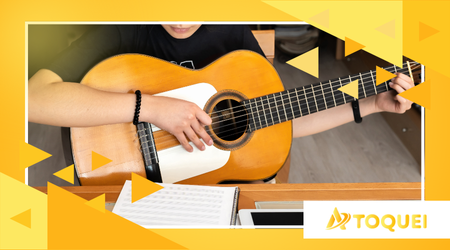How to Study Music Without a Teacher: A Guide for Self-Taught Music Students

The Power of Musical Autonomy
How to study music without a teacher? The pursuit of independent musical learning isn't new, but its effectiveness has been amplified.
Advertisements
The internet, in its vastness, offers unimaginable resources for those seeking to master an instrument or musical theory.
Discipline and organization are fundamental pillars for self-learning. Without guidance, you are the architect of your own curriculum and the evaluator of your progress.
Musical self-study develops not only your technical skills, but also your research, problem-solving, and self-critical skills.
Your passion for music will be your driving force. It will fuel your resilience in the face of challenges and keep you on track.
Advertisements
Unraveling the Theoretical Universe
Music theory is the backbone of any solid learning experience. Understanding its fundamentals is crucial for development.
Start with the basics: scales, chords, rhythm, and harmony. There are countless books and online platforms dedicated to these topics.
Think of theory as a map of an unfamiliar city. You can explore it without it, but you'll have less clarity about where you are and where to go.
A good starting point is Bohumil Med's book "Music Theory." It offers a solid and accessible foundation for beginners.
Daily practice of theoretical concepts is vital. Apply what you've learned to your instrument or to compositions.
++ Easy Song Tutorial to Practice Rhythm and Chord Changes
The Art of Mastering an Instrument
Choosing an instrument is the first exciting step. Select one that truly resonates with your soul.
Commit to regular study sessions, even if they're short. Consistency is more important than sporadic intensity.
Use video tutorials, tablatures, and sheet music available online. Many renowned musicians share their knowledge for free.
Record your practice sessions. This allows you to identify mistakes and objectively track your progress.
For example, if you're learning guitar, start with basic chords and simple progressions. Then progress to more complex techniques.
++ how to study music alone and get results
Essential Resources for Self-Taught People
The digital age has democratized access to information in an unprecedented way. Today, how to study music without a teacher is a reality facilitated by a multitude of tools.
Platforms like Coursera and edX offer music courses taught by renowned universities. Many of them are free in audit mode.
YouTube channels are veritable schools. Talented musicians share lessons on theory, technique, and repertoire.
Ear training and sheet music reading apps are powerful allies. They enhance your musical perception in a fun way.
Online forums and communities are great for asking questions. Interact with other self-taught learners and share experiences.
++ How to Play in a Band Without “Fighting” with Other Instruments
The Importance of Persistence and Patience
The self-taught path requires an extra dose of determination. There will be moments of frustration and stagnation.
Don't compare yourself to other musicians. Every journey is unique, and what matters is your own progress.
Celebrate every small victory. Mastering a new chord or a simple melody is already a big step forward.
Patience is an essential virtue. Musical mastery is an ongoing process, not a final destination.
Remember Thomas Edison's famous quote: “Genius is 1% inspiration and 99% perspiration.” Constant practice is the key.

Creating an Effective Study Plan
A well-defined script enhances your learning. Structure your sessions intelligently.
Set clear, achievable goals. Start with weekly goals and then progress to monthly and yearly ones.
Divide your time between theory, technique, and repertoire. A balanced approach prevents burnout.
Consider the Pomodoro Technique to optimize your studying: periods of intense focus followed by short breaks.
Constantly review what you've learned. Spaced repetition helps consolidate knowledge.
++ Techniques to Memorize Repertoire More Easily
Assessing Progress and Adjustments
Knowing where you are and where you're going is vital. Constant self-assessment is your compass.
Record your performances regularly. Compare recordings to identify improvements and areas for improvement.
Ask musician friends or online communities for feedback. An outside perspective can be very helpful.
Don't be afraid to adjust your study plan. If something isn't working, change your approach.
A 2021 Cambridge University study found that students who practice regular self-assessment demonstrate a significant increase in knowledge retention and academic performance.
Reinforcing the idea that how to study music without a teacher effectively involves self-analysis.
Overcoming Common Obstacles
Creative block can set in. In these moments, try changing your instrument or musical style.
Lack of motivation is your enemy. Remember the initial reason that drove you to learn music.
Find a supportive community. Sharing challenges and successes with other musicians can be a great boost.
Table: Essential Resources for Self-Taught Musicians
| Online Resource | Description |
| YouTube | Tutorials, instrument lessons, musical analysis |
| Theory.com | Interactive content for music theory |
| Musictheory.net | Exercises and lessons in theory and auditory training |
| Musescore | Free sheet music and music notation software |
| Ultimate Guitar | Tablatures and chords for various instruments |
The Unique Journey of the Autodidact
Music is a universal language, and mastering it without a teacher is a remarkable achievement. Don't underestimate your learning ability.
Enjoy the freedom of learning at your own pace. You have the autonomy to explore the paths that interest you most.
The reward of playing your favorite music or composing something of your own is immense. That's the true essence of the journey.
So, are you ready to embrace the challenge of how to study music without a teacher and become the conductor of your own education?
Frequently Asked Questions
Is it really possible to learn music from scratch without a teacher?
Yes, it's entirely possible with discipline, access to quality resources, and a well-structured study plan. Many renowned musicians began as self-taught musicians.
What are the biggest challenges of learning music on your own?
Key challenges include the lack of immediate feedback, the difficulty in correcting bad habits, and the need for constant self-discipline.
How long does it take to learn to play an instrument without a teacher?
The time varies greatly from person to person and from instrument to instrument. Consistency in practice is more important than the amount of time per day.
Small daily sessions are more effective than long, sporadic sessions.
Do I need natural talent to learn music without a teacher?
No. Musicality is a skill that can be developed by anyone with dedication and practice. "Natural talent" is often the result of early and consistent exposure to music.
How can I stay motivated when studying alone?
Set small goals, celebrate your achievements, participate in online communities, and always remember the pleasure that music gives you.
Listening to and appreciating different styles of music also helps keep the passion alive.
